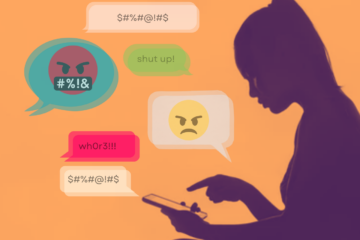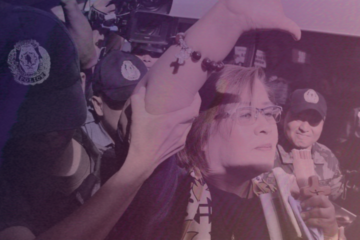Mapping online gender-based violence in the Philippines (2018)
In light of recent comments made by public officials that treated sexual assault as a mere joke, rendering it “acceptable” and not worthy of condemnation, it is important for Filipinos to be cognizant about the gravity of gender-based violence.
The current patriarchal and misogynistic culture pervading the country, further perpetuated by men in power, enables perpetrators to commit violations by putting the blame on women. This endangers more women, not just offline but also online.
According to the Association of Progressive Communications (APC), online gender-based violence encompasses acts that are committed, abetted or aggravated, in part or fully, by the use of information and communication technologies (ICTs), such as phones, the internet, social media platforms, and email.
Online gender-based violence can affect and harm any woman regardless of her status in society. It is part of a continuum reflecting the violence women face in the real world.
The gravity of online gender-based violence
A 15-year old girl was raped by five young men in Bamban, Tarlac in July 2018. The girl, along with her friend who was also molested, chatted with the suspects through Facebook. They agreed to meet up with them at 4:30 in the morning to go drinking.
After just a few drinks, the girls felt dizzy because apparently their drinks were drugged by the perpetrators.
When the girls woke up at around 7:00 am, they have already been violated and the act was recorded by the young men. The perpetrators uploaded the video on Facebook where it was circulated.
In cases such as this, not only are the victims/survivors harmed once, but the trauma and the damage are further exacerbated by the video being viewed and shared online.
For this reason alone, sexual violence whether done in the real world or in the digital space should never be taken lightly.
Some types of harm experienced by women as a result of online gender-based violence include psychological harm where the victims/survivors experience depression, anxiety and fear.
Women may also suffer social isolation, which may impede their public participation. This is especially true for women whose photos and videos were distributed online without their consent. They tend to avoid any contact and communication with family, acquaintances, and friends due to such circumstances.
Online gender-based violence also brings economic harm for women. Some victims/survivors are forced to take a leave from their work, lose their employment and their productivity decreases as a result of the spread of malicious contents such as photos and videos online.
In the case of students who are victims of online gender-based violence, they may be expelled from their school because of engaging in immoral, indecent, obscene or lewd acts that violate the provisions of the school’s policy for the students.
Some women have resorted to self-censorship due to lack of trust in the safety of digital platforms and for fear of continuous bullying and other forms of harassment. Women tend to withdraw from their online activity and this kind of withdrawal has implications on access to information, online services and social communication.
It happens more often than you think
The Philippine National Police Anti-Cybercrime Group (PNP-ACG) has recorded 522 cases of online libel, 226 online threats, 202 cases of photo and video voyeurism, 197 computer-related identity theft, and 127 cases of hacking from 2016 to March 2017.
Other cases investigated by PNP-ACG based on walk-in complaints are unjust vexation, sextortion, child abuse, child pornography, and violations of the Anti-Violence Against Women and Children Law, or RA 9262.
Over the years, FMA has observed a growing incidence of gender-based violence and how it has taken on new forms, occurring in the context of modern and digital society. From 2012 up to the present, FMA has mapped 295 cases of online gender-based violence in the Philippines, mostly sourced from media reports. See ph.tbtt.apc.org.
The cases of online harassment include photo and video voyeurism, sextortion, threats of violence and blackmail, identity theft (including deleting, changing and faking personal information), monitoring and tracking, and online child pornography.
From January to June 2018 alone, FMA has mapped 38 cases of online gender-based violence. Majority of these happened in Metro Manila and Cebu City.
84% of women, aged 30 years old below are more likely to experience online violence. 53% of the women suffered repeated harassment, 58% experienced threats of violence or blackmail, 29% had their private information sent and disseminated, and 24% had their photo and their video taken without their consent.
The victims/survivors have also experienced some form of harm or abuse. 82% of these women experienced emotional harm, 63% of them reported being sexually assaulted, while 45% experienced physical harm, and 37% of them had their reputations damaged. These resulted in the women being discouraged to socialize and get involved not just online but offline.
It is important to note that one case may fall under different categories of violations and a victim/survivor may experience different types of harms or abuse.
Violations occur in different platforms with 42% of them being perpetrated through mobile phones, 34% through Facebook, and 27% through video/webcam.
It is even more disturbing to think that majority of the reported cases are perpetrated by someone whom the victim/survivor knew.
How the victims/survivors fight back
35 out of 38 victims/survivors have sought assistance from the law enforcement authority. 29% of the cases are under investigation but only 8% of the reported cases have been brought into trial.
21% of victims/survivors sought help from State offices that specialize in violence against women (VAW) counselling and other psycho-social intervention.
Other strategies include reporting abuse to the platform, leaving and/or changing the platform, blocking the aggressor on the said platform or device, and having a dialogue or confrontation with the aggressor.



0 Comments